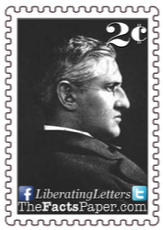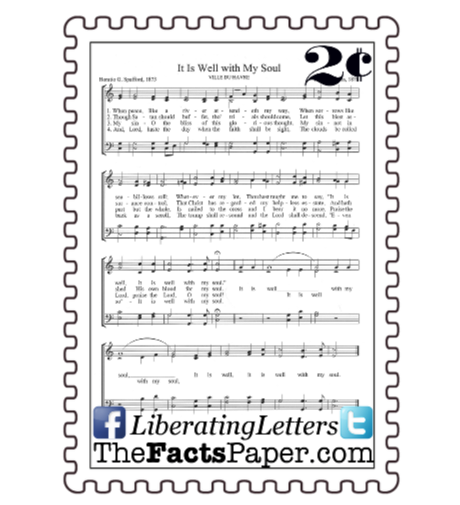December 29, 2018
Dear Liberty,
Horatio’s hands began to shake as he read the words on the telegram. Tears ran down his face as his knees became weak. He slumped into a chair as he wiped his eyes to read the message again. “Saved alone. What shall I do?”
It was just a few days ago that Horatio Spafford put his wife, Anna, and their four daughters, Anna (age 11), Margaret (age 9), Elizabeth (age 7), and Tanetta (age 2) on the ship Ville du Havre to Europe. Delayed because of an unexpected business issue, Spafford planned to follow a few days later.
The family desired a much-needed vacation after several years of hardship. Five years earlier, their young son, Horatio Jr., died of scarlet fever. A prominent lawyer and senior partner in a prestigious Chicago law firm, Spafford’s portfolio included extensive properties along Lake Michigan. As the Great Chicago Fire destroyed 3.3 square miles of the town from October 8-10, 1871, Spafford watched everything he had burn to the ground. Thankful they still had their family, Spafford and Anna picked up their lives and moved on.
In 1873, the couple planned a trip to Europe in November. Their friend, evangelist Dwight L. Moody, was touring the United Kingdom, where he preached to thousands and gained attention from well-known preacher Charles Spurgeon. (see Prince of Preachers) The devout Christians arranged to meet Moody in Europe and listen to him preach.
As the Spafford women were on route, the ship collided with the iron sea vessel, Loch Earn, on November 22, 1873. Within minutes, the wreckage sunk, killing all four girls. Immediately upon her arrived in Cardiff, Wales, with the other 27 survivors a few days later, Anna sent word of her lone survival to her husband. Spafford immediately left for Europe to collect his grieving wife.
Spafford clung to his faith as his ship slowly broke through the ocean waters. He prayed in his cabin as he tried desperately to make sense of this senseless tragedy. A knock on the door woke Spafford from his introspection. The visitor informed him that the captain wished to see him. As Spafford was escorted in, the captain soberly welcomed him to the bridge.
The men exchanged pleasantries before the captain informed Spafford they were traveling over the spot where the Ville du Havre sank. Spafford returned to his cabin, not with a heavy heart, but with a sense of peace in his soul. Taking a seat at his desk, Spafford reached for a pen and paper. As he began to write, the words seemed to flow effortlessly.
When peace like a river, attendeth my way,
When sorrows like sea billows roll;
Whatever my lot, Thou hast taught me to know
It is well, it is well, with my soul.
Though Satan should buffet, though trials should come,
Let this blest assurance control,
That Christ has regarded my helpless estate,
And hath shed His own blood for my soul.
My sin, oh, the bliss of this glorious thought!
My sin, not in part but the whole,
Is nailed to the cross, and I bear it no more,
Praise the Lord, praise the Lord, O my soul!
For me, be it Christ, be it Christ hence to live;
If Jordan able me shall roll,
No pang shall be mine, for in death as in life,
Thou wilt whisper Thy peace to my soul.
And Lord, haste the day when the faith shall be sight,
The clouds be rolled back as a scroll;
The trump shall resound, and the Lord shall descend,
A song in the night, oh my soul!
IT IS WELL

In 1876, composer Philip Bliss wrote a tune for the poem, which he named Ville du Havre after the sunken ship. On November 24, 1876, exactly three years and two days after the tragic event, Bliss introduced the world to the new hymn. He performed the hymn before an assembly of ministers during an event hosted by Moody in Chicago. Just a month later, tragedy also struck Bliss and his wife. On December 29, the couple was returning to Chicago by train from out East. As the train crossed a trestle near Ashtabula, Ohio, the bridge gave way. The Bliss’s passenger car plummeted 75 feet into the icy river below. Miraculously, the couple survived. Philip worked his way free and escaped through a window, yet his wife remained pinned under the debris. Philip re-entered in efforts to free his wife moments before the wooden car became engulfed in flames. The couple perished within the fire.
After the loss of all their children, Spafford and his wife picked themselves up and started over again. Yet the pain and suffering began to take a toll on Spafford’s faith. They couple started another family, having three more children: Horatio Jr (1877), named after his deceased brother, Bertha (1878), and Grace (1881). However tragedy struck again in 1880 when their second son died of scarlet fever, just like his brother. Following his death, instead of comforting the family with Christ’s love, peace, and grace, the Spafford’s church started questioning if they were being punished by God.
By the Grace of God, the family did not abandon their faith. On the contrary, they became more faithful. They started their own Messianic sect, which became known as “the Overcomers.” Their daughter born in 1881 was appropriately named “Grace” as an affirmation of their hope in Christ.
Shortly after Grace’s birth, Spafford refocused his mission in life, stating, “Jerusalem is where my Lord lived, suffered, and conquered, and I wish to learn how to live, suffer, and especially to conquer.” Therefore, the family packed up everything and moved to Jerusalem, along with thirteen other adults and three children, in September of 1881, where they purchased a home and set up a commune that became known as the American Colony. Joined by a group of Swedish Colonists, the colony members engaged in humanitarian work throughout the Jerusalem area. As Jewish, Christian, and Muslim communities existed in the region, the colony helped those in need regardless of religious affiliation. (see The State Of Israel)
After losing their own boys, Spafford and Anna adopted a teenager, Jacob Eliahu, a Turkish Jew. Jacob coincidentally had discovered the Shiloah inscription in the Siloam tunnel in 1880. The inscription was a tremendous archaeological find, dating back to the 8th century BC.
Despite all his humanitarian work, Spafford suffered in his death as well. He contracted malaria fever, which caused him to become delusional. Born October 20, 1828, Spafford died of the fever just short of his sixtieth birthday on October 16, 1888. Anna remained in Jerusalem, continuing the couple’s work, until her death in 1923. Both were laid to rest in Mount Zion Cemetery in Jerusalem.
With the world in turmoil due to World War I, the American Colony played a key role in helping the communities in Jerusalem. (see The Shot That Changed The World) Especially affected and helped were the victims of the Assyrian and Armenian Genocides. (see Red Sunday)
Following an event on Christmas Eve 1925, the couple’s daughter, Bertha Spafford Vester began the Spafford Baby Home. After a few years, it developed into the Spafford Children’s Home and remains in operation today on the original American Colony site as the Spafford Children’s Center.
As the colony grew, the members needed a suitable location to live. At the end of the 19th century, the group purchased a palace built for a pasha and his four wives. The palace soon became a lodging facility for Western travelers and pilgrims. When the Colony itself dissolved as a communal society, the palace continued on as the American Colony Hotel. It hosted the first talks between Palestine and Israel, which eventually resulted in the Oslo Peace Accords in 1983. (see The State Of Israel)
Most accounts claim daughter Bertha verified Spafford wrote the hymn on the ship, yet one report gives credence to a reliable source stating he wrote it two years later. This timeline would coincide with Bliss’ composition of the music. It is also know that the forth verse was not part of Spafford’s original lyrics and added later.
But Lord, ’tis for Thee, for They coming we wait,
The sky, not the grave, is our goal;
Oh, trump of the angel! Oh, voice of the Lord!
Blessed hope, blessed rest of my soul.
Regardless of when the hymn was written, the message conveys a deep and heartfelt faith in Christ. It comforts us with the knowledge that no matter what trials and tribulations we face, if we stand with Christ, It Is Well With My Soul.
Liberty, we can never know for sure what plans God has for us. While we may believe we are on the right path, God may need us elsewhere to do His work. Trials and tribulations will test our faith, just as they tested Job in the Old Testament and just as they tested Spafford. Both men lost everything. But through faith, God blessed them even more. He restored Job’s family and fortune, making it larger than it originally was. In Spafford’s case, he began a humanitarian organization that exemplifies how we should love others as God’s people. Furthermore, Spafford’s legacy continues on today, over 100 years later.
Satan wants nothing more than to separate God from His people and the ones with the biggest target on their back are faithful Christians. Life is not going to be easy. There will be hardships, disappointments, and possibly devastating tragedies. Yet as with Job and Spafford, remember these are not punishments from God. They are the results of a sinful world. Therefore, find comfort in the arms of your Heavenly Father, who sent His perfect son to earth for the sole purpose to die for our sins. In comparison, what earthly tragedy could be more painful for a parent than that?
Hope is not found in joy and prosperity. Hope is discovered in tragedy. A beautiful hymn of faith and assurance was surrounded by and inspired by suffering. However, it allowed Spafford and Bliss to witness to the hope they found in Christ. Liberty, daily meditate on how deep God’s love is, so when you are faced with tribulations, it will be easier for the Holy Spirit to lead you to the comfort of the cross.
That’s my 2 cents.
Love,
Mom

